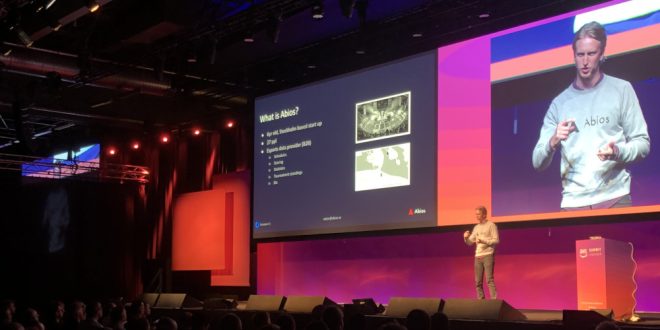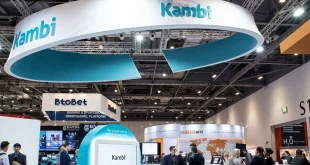Esports data and statistics specialist Abios notched up 10 years of trading last month. Here we speak with Abios Co-founder and CTO Anton Janér who shared his thoughts on reaching that milestone, as well as some of the key developments that have shaped the company en route.
Congratulations on reaching your tenth anniversary. Can you tell us more about the company’s early days and how it began trading?
Thank you, it has been an incredible journey, and I can’t believe it has already been 10 years. Abios started as a platform providing esports fans with calendars, schedules and tournament information for their favourite esports titles. Me and Oskar (Oskar Fröberg, Abios CO-founder and CEO) edited and added data manually in the beginning, which meant that we had to be available 24/7.
The platform got very popular among esports fans, and we released a Chrome extension and mobile app in 2015. However, we realised that a website would take a long time to get profitable relying on ad revenue alone, so we opted for a B2B model from 2016 instead. The rest, as they say, is history.
What has been most challenging in building Abios’ tech stack?
Data sources are measured by their reliability. When we were a B2C platform, esports fans turned to our website because they knew they could find accurate match schedules and information. They would have moved to a competitor if they didn’t find what they were looking for.
As we handled vast amounts of data daily, we quickly realised we needed a scalable system. Consequently we have chosen to work with Amazon Web Services to power our products. The cloud platform has allowed us to scale rapidly while having the infrastructure and processes to build sustainably according to best practices. We have put significant resources and thought into building the proper infrastructure from the start. Vast databases can be cumbersome and time-consuming to change, keep up to date and scale if built incorrectly.
As a B2B data provider, this thoughtfulness in systems design has been increasingly important as we’ve scaled up and powered exceedingly large customers and use cases. For our customers to be able to rely on our systems around the clock, we’ve built a foundation of scalable, reliable and robust products with virtually zero latency. While it has provided its own set of complicated challenges, it has been very fun.
Are there any specific issues with esports data that have been particularly hard to solve?
The very nature of our business, esports data, comes with unique technical challenges. One example is central data models encompassing data points from esports competitions and deciding what relationship they have with each other. It can be simple enough, with a player being part of a team or Baron kills being part of a League of Legends match.
However, when we look at an industry such as esports, where roster changes can occur with a few minutes’ notice and items of a hero can decide the outcome of a match, it’s vital to model all of the data and their relations to each other in the right way. Otherwise, it can lead to critical errors in more complicated sequences down the road.
Also, somewhat counterintuitively, the data we extract from servers is often “broken” to some extent and not really meant for our use cases. Games are meant to be engaging to play and visually satisfying, not to be data farms. This requires us to do a lot of data verification and cleaning in real-time before it has value to our customers.
What significant technological developments have affected your company in its growth journey?
A significant inflection point on the technical side has been the containerisation of code and applications and the orchestration of said containers. While it isn’t anything new, the latest developments in the area, including efficient CI/CD, have enabled much of the technology we see today and allow small and large enterprises to utilise similar methodologies to achieve efficiency in their working methods.
At Abios, we’ve seen significant technological shifts across the field. In 2013 when we started, the first version of Kubernetes had not even been released, not to mention being a hosted service at AWS. At that time, GPUs were enormously costly to run ML/AI on, whereas today, we have relatively cheap specialised hardware for it. Many of these advances are now hygiene factors for being productive and competitive in tech.
AI and big data have arguably been big buzzwords in recent years. Being a data company, have you seen these features impacting your business?
As a data company in a new and emerging market, our partners, media, and investors have naturally been keen to understand how we use technologies such as “big data” and “AI”. While some have suggested, or even pushed, for the usage of said technologies, we have always made sure only to utilise it where it makes sense for our technical and/or product needs, not just for the sake of it.
Several use cases within our organisation benefit greatly from these technologies. Not least our Computer Vision algorithms, which extract data from video streams of esports games to get various data points with low latency to our customers where no server data is possible to extract. It is equally powerful in modelling various aspects of esports matches or the relative strength of competitors that feeds into the full product portfolio.
Tell us how you’ve expanded from providing esports data to fans to powering some of the largest entities in esports.
It all started with a strong brand in esports. In our B2C days, we utilised various bootstrapped marketing tactics to draw attention to our brand. From being active in social media and communities to hosting a tournament in Hearthstone in Dracula Castle in Transylvania, Romania.
The esports community was smaller back then, and we quickly got to know many people in the industry. As such, many companies saw what we did with data and were interested in acquiring it for their business. But of course, at the very core of the journey has always been steady and hard work with the data itself, building the best possible data products.
Your ambition is to get your new prediction products to the market and compete with the leading products. What details can you share with us about those products?
Generally, we want to offer the product features in esports that customers expect for their mature sports products. It ranges from high uptime, low bet delays and exciting market features to full compliance in relevant markets.
We’ve identified that the current products in the market lack some aspects we believe will be crucial in attracting esports fans. We believe esports fans want fast and exciting offers surpassing traditional match winners and handicaps. In CS:GO, fans should be able to bet on the winner of each round rather than solely on the outcome of the entire game. As such, we will enable flash markets and round-by-round betting that allows fans to bet on the action as it happens.
Moreover, just as in sports, each individual professional player has an enormous impact on each game. We want bettors to be able to bet on attributes of their favourite players, so we offer player props for the most popular matches.
While it is not unheard of in traditional sports, in-event-combinations are still a new concept, and the combinatory aspect is limited. We are now bringing this to esports and will work hard to make as much of the offering as possible combinable.
Our ambition for the year is to bring esports on par with traditional sports in terms of markets and products. Next year, we’ll take the vast amounts of data available to us in esports to continue innovating and building new and exciting product features unique to the digital nature of esports.
What’s life been like so far under the wing of Kambi Group, and how do you see the next 10 years shaping up for the Abios brand?
Becoming part of Kambi has been a very positive experience. In many ways, we work in the same ways we have before. We own our brand, revenues and cost structure, customers and products.
Kambi acts as a supercharger for many parts of the organisation, where different departments of Abios can get additional support and feedback from the larger organisation. It was evident when we got swept under Kambis’ extensive legal and regulatory umbrella, providing us with the tools and resources to stay compliant in key markets. It has indeed been an invaluable resource and allowed us to scale commercially faster than we could have on our own.
With Kambi at our back and Shape Games at our side, we’re looking forward to the coming years and hope to provide an even better experience to customers and partners across various industry segments. Building esports infrastructure has always been our mantra, now we have the backing and tools to continue doing just that long into the future.








